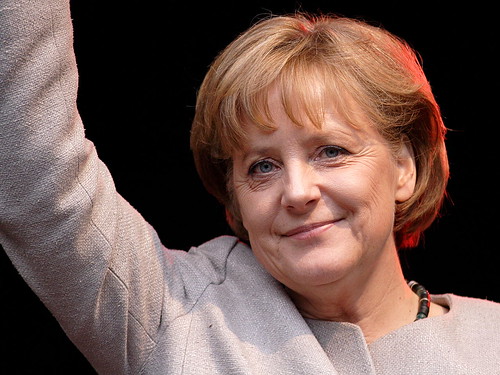
After two months of haggling, a final coalition agreement between the CDU/CSU and the SPD has been hammered out. The 185 page- document is with the title “Shaping Germany’s future” is supposed to set the tone for Germany’s new ‘grand coalition’ (in Germany the coalition is also known as GroKo which stands for Große Koalition). However, the deal sends a clear message: Merkel still holds the reigns and we are not about to witness a volte-face in German policies on Europe and foreign affairs.
The broad consensus established in the coalition agreement means that there is little sign of major innovation or a drastic change in direction in terms of European and foreign policy. On one hand, this can be seen as uninspired as the incoming German government demonstrates no real ambition for leadership in European and international affairs – with the notable exception of the euro crisis. On the other hand, as long as nobody moves, nobody gets hurt; Germany remains a reliable and unobtrusive partner in the world.
What can be said is that, on the basis of the new agreement, the next ruling coalition is clearly more pro-Europe than its predecessor. Many of the policies and priorities mentioned in the agreement are to be implemented in conjunction with European institutions and partners – even when these will be domestic reforms such as training programmes for young people or the Energiewende.
Furthermore, the entry of the Social Democrats into government seems to be leading to a greater emphasis on growth stimulation in the crisis-stricken southern member states. Of the few concrete pledges that have been made, the most notable are the financial transaction tax and the implementation of the “2012 Growth and Jobs Pact” worth €120 billion. Emphasis has also been laid on the establishment of a functioning banking union, with a supervisory board and uniform regulation across the eurozone – though few further details have been given. Both partners have ruled out some of the more controversial and radical ideas such as debt pooling and joint liabilities.
In terms of its most important allies, the document stresses the centrality of Germany’s partnerships with France and Poland, the so-called Weimar Triangle. Furthermore, the relationships to the United States, Russia, Israel, China and India are all highlighted. While the EU enlargement process towards the Western Balkans has been underlined as vital, the reference towards Turkey demonstrates the different approaches of CDU/CSU and SPD. While the SPD advocates the enlargement option, the Christian Democrats favour a “privileged partnership” relationship with Turkey.
The special ties between Germany and the United States are underlined, but it is acknowledged that the revelations around the NSA’s activities have burdened the relationship. In fact, it is conceivable that Germany may well take the lead in demanding that a data protection agreement be included in the current negotiations with the United States on the Transatlantic Trade and investment Partnership (TTIP).
At a European level, the coalition agreement acknowledges the demands which ECFR has been stressing for some time: the need for a Europe-wide strategic discussion to determine what it wants to achieve in foreign and security policy. Nonetheless, despite this affirmation, many of the proposed methods and means seem to be a mere rehash of traditional commitments.
With regards to the European Council summit in December which is dedicated to Security and Defence policy, the new German government’s most concrete proposal to deepen intra-EU cooperation on security policy is a defence policy meeting of all heads of government of all EU member states once a year. Aside from the well-known reference to “pooling and sharing” (but no genuinely new commitments on this issue), the document provides little indication of what German priorities in the field of CDSP could look like.
There seems to be also little appetite for a greater German role in EU or NATO missions, let alone leadership. The Coalition commits itself to getting parliamentary approval for each and every deployment, and concrete proposals to review this very strict and time consuming procedure called “Parlamentsvorbehalt” have already been rejected by a huge majority within the new coalition.
The agreement is no visionary strategic masterpiece in the field of European and foreign policy – but realistically it was never going to be. While they differ on domestic issues, the general consensus on external affairs has meant that much has been left unsaid in the area of foreign and security policy, and European issues in general. A lot will therefore depend on the next Foreign Minister to develop a coherency which has hitherto been lacking in both German and EU foreign policy. According to rumours in Berlin, Frank-Walter Steinmeier will return to his seat as the head of the Foreign Ministry while the CDU’s Wolfgang Schaeuble retains his grip as head of the influential Ministry of Finance.
Finally, the entire project of the “Grand Coalition 2.0” stands under the proviso that this coalition agreement must first be approved by the 470,000 SPD party members who [will] vote on it [next week] and have the choice to send the SPD back into government or spiralling into one of their deepest ever crises. In any case, SPD chairman Sigmar Gabriel seems to be correct when he claims that this vote will determine the fate of his party for the next twenty years.
This is a cross-post from the ECFR Blog. It was first published by the European Council on Foreign Relations on 28 November 2013.
For additional reading on this topic please see:
The Visegrad Group and Germany: Towards a New Paradigm
German Exports: A Booming World Will Not Replace the Eurozone
Merkel III in EU and Foreign Affairs – It’s the Spirit, Stupid!
For more information on issues and events that shape our world please visit the ISN’s Weekly Dossiers and Security Watch.

